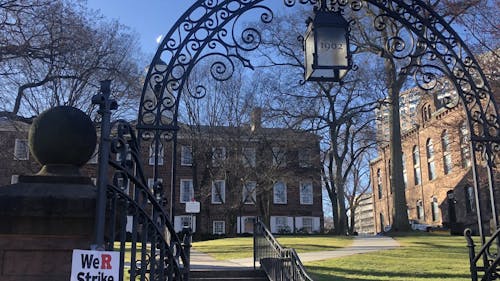Rutgers AAUP-AFT, Adjunct Faculty Union vote to authorize strike

The Rutgers American Association of University Professors and American Federation of Teachers (AAUP-AFT) and the Rutgers Adjunct Faculty Union (PTLFC) have successfully authorized a potential strike, according to a press release.
The release was signed by Rebecca Kolins Givan, president of Rutgers AAUP-AFT, and Amy Higer, president of Rutgers PTLFC, and stated that of the 80 percent of union members who voted, 94 percent voted in favor of authorizing the strike — approximately 75 percent of total union members voted to authorize the strike.
The vote does not automatically result in a strike by all union faculty, but it does give the AAUP-AFT and the PTLFC's bargaining committee the authority to call for it in the future. If the committee does so without successful negotiation with the administration, Rutgers will experience its first faculty strike in history.
Howard Swerdloff, Rutgers PTLFC secretary and a part-time lecturer in the Rutgers Writing Program, said the vote's results are an astonishing feat for the union that were primarily generated by the nationwide sentiments of university instructors and the methodical work of Rutgers' union members.
He said he would be surprised if the University does not act on the results of the vote.
"I think (the University) made a serious miscalculation by dragging this out so long … they thought we would get demoralized. In fact, we got more and more determined," Swerdloff said. "So I can't understand their strategy. They could have settled this a long time ago."
He said he wants the Rutgers administration to take these results seriously and hopes the University does not disturb students' studies and employees' work.
In a statement to The Daily Targum, University Spokesperson Dory Devlin, the senior director of University News and Media Relations, said the University has held many bargaining negotiations and is willing to hold more if needed.
She said that in the past, prior strike vote authorizations have occurred at this point in the contract negotiation process, but the unions ultimately did not strike during those instances.
"No one wants to disrupt students’ academic progress, and we are committed to working as hard as we possibly can to negotiate contracts with our unions that are fair, reasonable and responsible," she said in the statement.
Sebastian León, an assistant professor in the Department of Latino and Caribbean Studies and the Department of Criminal Justice and an AAUP-AFT executive council member, said the intentions behind the potential strike are not to disrupt students' work or graduation but to actually create a better learning environment.
"A strike is not something that we as faculty do to harm students, on the contrary, it's really aligned with students' learning conditions and making sure that the message is clear," said León.
From the Rutgers administration's perspective, University President Jonathan Holloway released a statement on Monday that addressed the ongoing labor negotiations with the unions, stating that he is aware of the vote and wants to reach an agreement.
In response to Holloway, Swerdloff and León said that Holloway's response displayed gaslighting and framed the unions' advocacy as solely about higher pay, which distorts the real reasons behind the groups' efforts.
"It's really unfortunate because, to me, it reads like it's intended for the public and for parents to be like, 'Oh, look at these union professors inconveniencing you because they want fatter paycheck' or something like that," León said. "And that's 1 trillion percent not what the contract campaign is about. The contract campaign is about basic, basic, basic material needs and protections."



